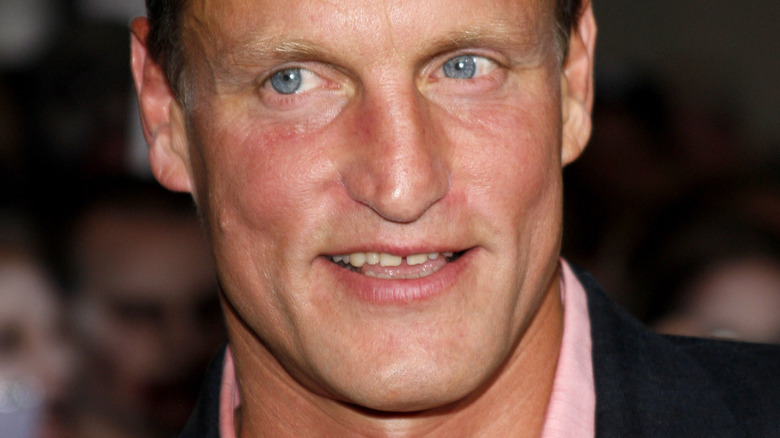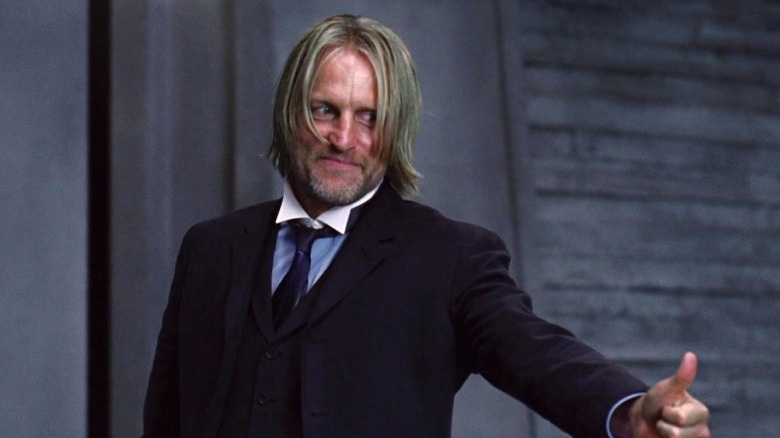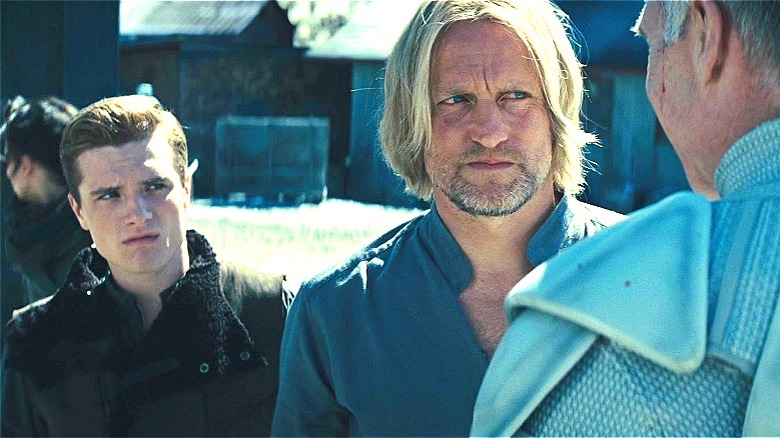The Real Reason Woody Harrelson Originally Turned Down The Hunger Games
When "The Hunger Games" was first released over a decade ago, it was lightning in a bottle in more ways than one. After all, who among us doesn't appreciate a dash of child murder along with their love triangles?
However, "The Hunger Games" uses that love triangle set up to tell an important story. Katniss (Jennifer Lawrence) and Peeta (Josh Hutcherson) must deal with their trauma from the games while a rebellion brews against the oppressive government of Panem, of which Gale (Liam Hemsworth) becomes a part. Meanwhile, mentor Haymitch Abernathy has his own demons, making him a layered character that anyone would love to play. With all his sarcasm and swagger, there is seemingly no one better to play him than Woody Harrelson.
When we first meet Haymitch in "The Hunger Games," the District 12 mentor is more than reluctant. His time in the arena has scarred him, as it has all remaining victors. The only way he can cope with his crippling emotional wounds (and having to see every subsequent District 12 tribute die) is a life of alcoholism and loneliness. Despite this deep well of emotion to explore in the character, Harrelson was also reluctant to take on the role of the lovable curmudgeon.
Harrelson was not impressed at first
Before Katniss took up her bow and arrow, director Gary Ross had difficulty clinching Woody Harrelson in the role. Though Suzanne Collins' book series was extremely successful, Harrelson was showing some resistance to joining the project.
"I turned down 'Hunger Games' twice," Harrelson admitted to The Hollywood Reporter in an interview. "I didn't have any idea it would be that big, but I didn't think it was a good part. I was wrong." Even though Harrelson didn't particularly like what the role of Haymitch was offering, he was soon proven wrong. Throughout the four films in the franchise, Haymitch has an incredible arc, one that starts with him pushing absolutely everyone away and ends as one of Katniss' only emotional touchstones. Both share extreme emotional torment and a passionate desire to protect Peeta at all costs. Haymitch is a lynchpin of the series and is a force that brings many of the characters together.
Thankfully for fans of "The Hunger Games" at large, Harrelson ultimately reconsidered after a personal phone call from director Gary Ross. Ross had become invested in the project after his children had read the books and knew that Harrelson was the right choice, as Ross relayed to the The Hollywood Reporter in an email. Interestingly enough, both Harrelson and Haymitch first refuse to step into the role they were destined for — but as audiences know, "The Hunger Games" would go on to be more important than either first realized.
The dark themes of the series resonates to this day
Though it took turning down "The Hunger Games" twice and a personal plea from the director, Woody Harrelson ultimately came around to playing Haymitch. "The Hunger Games" became a sensation and the actor admitted later on that while at first he didn't connect with the role, the writing of the story was beyond reproach.
"I thought Suzanne [Collins] wrote incredible stories that are the perfect illustration of what's going in the world, with governments controlled by giant industries," Harrelson told The Independent. He went on to say, "It's a bleak outlook. It's a better look at the end of this fourth movie than it is right now in the world. It's frightening." Years after the first series of "The Hunger Games" films have concluded, this assessment remains difficult to disagree with. At the very least, the ending of "The Hunger Games" franchise has an element of hope. Katniss destroys the system that victimized her and can work on overcoming everything she has lost. She is able to find love because she isn't constantly worrying about the injustices that the government is implementing.
The books that Collins wrote held up a mirror to American society that can be uncomfortable to look at. The franchise's themes of oppression and overpowered governments are more prevalent than ever, making "The Hunger Games" — not to mention Harrelson's portrayal of a man broken by an unyielding system — timeless in an unsettling way.


